Graham Reid | | 5 min read
Too Much Monkey Business, by Chuck Berry
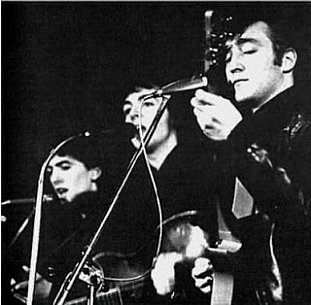
The best information we have about what songs the pre-Fab Four knew in those days before fame and acclaim hit in 1963 is that they could play somewhere over 80 – and perhaps even close to 100 – songs.
Everything from Elvis and the Everly Brothers (Blue Suede Shoes, Cathy's Clown) through Buddy Holly (the first song the pre-Beatles Lennon, McCartney and Harrison and others as the Quarrymnen put to tape was That'll Be The Day in '58) and on into Little Richard (McCartney even then an aural doppelgänger with the screams and whoops), Hank Williams, Chuck Berry and Chet Atkins.
That'll Be the Day, 1958
In Hamburg clubs they would also play show tunes and standards (Beautiful Dreamer, Begin the Beguine, Red Sails in the Sunset), current Motown hits, snatches of New Orleans jazz (Darktown Strutters Ball), music from films (The Harry Lime Theme from The Third Man), German ballads (Falling in Love Again) and contemporary songs like Frank Ifield's I Remember You (whose harmonica part inspired Love Me Do).
There were idiot amusements (It's a Long Way to Tipperary) alongside lengthy workouts on Ray Charles' That's What I Say and so much more….
Given the breadth and depth of their musical knowledge it should be no surprise that when they came to write their own songs – which didn't really happen much in Hamburg or Liverpool before they scored a recording deal – they had a vast well of musical ideas to draw from.
More than any other pop band of their period.
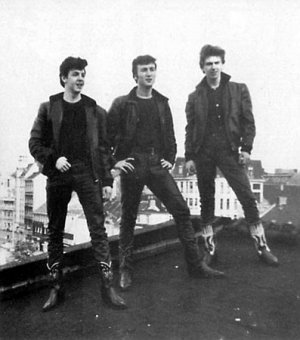 And, with all those
logged-in hours in Hamburg clubs then at the Cavern, you can believe
their assiduous biographer Mark Lewisohn when he says that no other
pop band in the world at the end of '62 – when they recorded their
debut single Love Me Do for Parlophone – had as much live
experience.
And, with all those
logged-in hours in Hamburg clubs then at the Cavern, you can believe
their assiduous biographer Mark Lewisohn when he says that no other
pop band in the world at the end of '62 – when they recorded their
debut single Love Me Do for Parlophone – had as much live
experience.
Factor in just a bit of studio time – a session in Hamburg with Tony Sheridan and some BBC sessions recored live for broadcast – and they well down the track before the other competitors had taken their positions at the starting line.
If people think the Beatles came from nowhere, then nothing could be further from the truth . . . except that it is also true.
They came from the North and the hip London cognoscenti would never have expected that, but they should have.
Because in the post-war years the class system was being eroded and “other voices” – like those from Manchester in Coronation Street which first broadcast in 1960 and plays like Billy Liar set in the working class world – were changing the cultural and linguistic landscape.
So phrases like “Eh chuck”, “E up, la” and “Come'ed” (the latter used by Lennon in A Hard Day's Night) started to enter the British argot.
And so did the songs the Beatles knew.
If you look at a list of songs they played in Hamburg, as compiled by the German authors of Mach Schau! Die Beatles in Hamburg, you can see how many of them were adopted by other groups (most from Liverpool) in the 18 months after the Beatles' success: Don't Let the Sun Catch You Crying (Gerry and the Pacemakers), The Hippy Hippy Shake (Swinging Blue Jeans), Road Runner (the Pretty Things), Some Other Guy (just about every Liverpool band) . . .
The songs the Beatles learned from and played in a three year period formed the cornerstone of British popular music and rhythm and blues in the early Sixties.
You only have to look at early Kinks and Stones albums to tick off a similar set list.
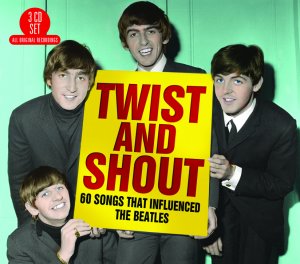 Can you imagine if a young
band today – it's oldest member just 22 and its youngest about 18 –
could command such a set list?
Can you imagine if a young
band today – it's oldest member just 22 and its youngest about 18 –
could command such a set list?
And so where to find such a catalogue?
It is on the three CD collection Twist and Shout: 60 Songs That Influenced the Beatles (Proper through Southbound in New Zealand).
Okay yes, it is just old rock'n'roll, soul, rockabilly, blues, doo-wop, Fifties ballads and . . .
Jeez! You get the picture?
This was a band with wide open ears – more so than your average genre-specific folk, indie, hard rock, metal et al outfit these days.
Most bands today find their niche and stick with it.
The best bands have never done that, they have looked beyond the obvious and into deeper roots, and asked who influenced those who influenced them.
It used to be called having “big ears”.
The Twist and Shout collection is impressively wide and encompasses everyone from Elvis, Chuck and Buddy to Fats Domino, the Coasters, Little Eva, Shirley Jones and Gene Vincent.
Many of these songs the Beatles recorded on early singles or their albums Please Please Me, With the Beatles, Beatles for Sale and Help!: Chuck's Roll Over Beethoven and Rock And Roll Music; Perkins' Everybody's Trying to be My Baby, Matchbox and Honey Don't; Little Richard's Long Tall Sally; Buddy's Words of Love; Larry Williams' Slow Down, Bad Boy and Dizzy Miss Lizzie; Barrett Strong's Money . . .
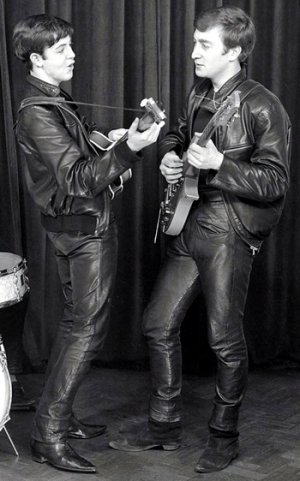 Because they needed to
fill out their lengthy sets in Hamburg the Beatles were obliged to
learn so many songs, many more than their peers back in Liverpool who
might play a half hour or one hour show every week or two. The
Beatles became musical sponges and borrowed or stole from everywhere,
and they continued to do that right throughout their career.
Because they needed to
fill out their lengthy sets in Hamburg the Beatles were obliged to
learn so many songs, many more than their peers back in Liverpool who
might play a half hour or one hour show every week or two. The
Beatles became musical sponges and borrowed or stole from everywhere,
and they continued to do that right throughout their career.
The influences changed (Dylan, Indian music) but the borrowing just went on.
The indisputable fact is that the Beatles, unfashionable as they might seem to people whose first musical memory is recent Beyonce or Coldplay, changed the face of popular music.
In rock, culture there is BB (Before the Beatles) and AB (After the Beatles)
Here is band which not only wrote their own music but played and recorded it.
But how did they get to the point where they – unlike their peers in '62 – had the confidence to write then insist on recording their own songs?
Because in the smoke-filled and violent bars of Hamburg and the fan-kid Cavern in Liverpool they had an astonishing catalogue of songs they knew and could play.
They might have sometimes played them badly when they were pilled-up and/or drunk . . . but they could play them.
They knew where the verses, the choruses, the male harmonies, the guitar “solo” (single string stuff from George) and shouty bits went.
They knew all these 60 songs – and many more – on the Twist and Shout compilation. There could just as easily be a compilation which included songs from the Goon Show, musical pieces which influenced McCartney (Rocky Racoon, When I'm 64 which they played as an instrumental in Hamburg before he got words for it in '67), novelty songs like You're a Pink Toothbrush . . .
They knew all these too.
And so, in the phrase we adopt from Telethons all those decades ago: “and we challenge all others to do the same”.
You pity the young band which tries to learn all 60 of these terrific and formative songs.
But once upon a time, a band actually did.
Seemed to serve them well.
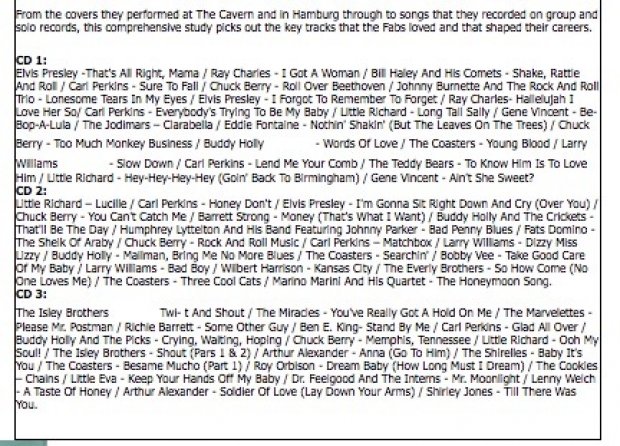

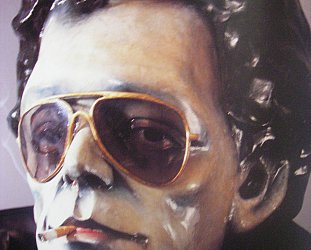
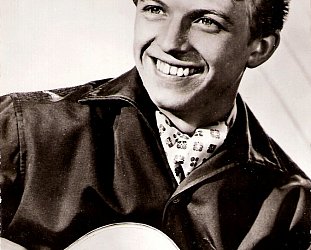
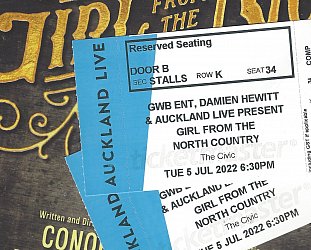
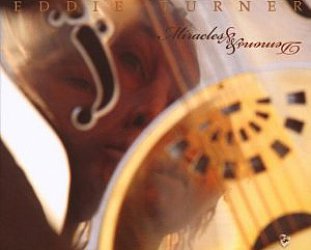
Graham Dunster - Mar 31, 2017
If there's one letter of the alphabet that holds the best bands it must be B - Beatles, Beach Boys, Band, Black Uhuru, Byrds, Budgie, Blue Oyster Cult - well, you get my drift!! GRAHAM REPLIES: Agreed, Brother Bob . . .
SaveVivienne Haldane - Mar 31, 2017
Great stuff and really interesting and adds to a bio I'm reading by Cynthia Lennon - who-was-there as they emerged. :-)
Savepost a comment